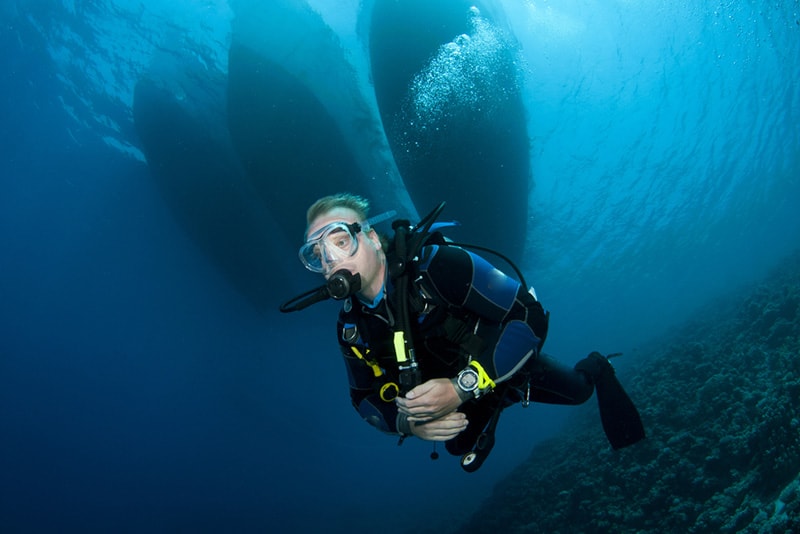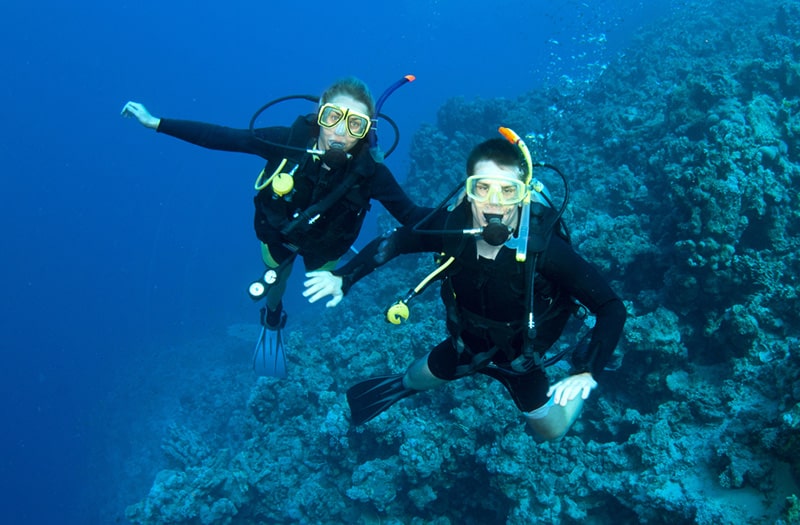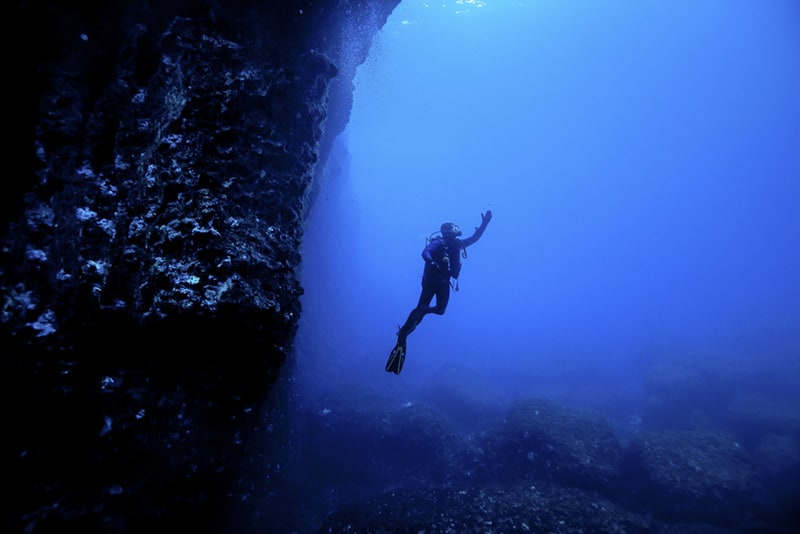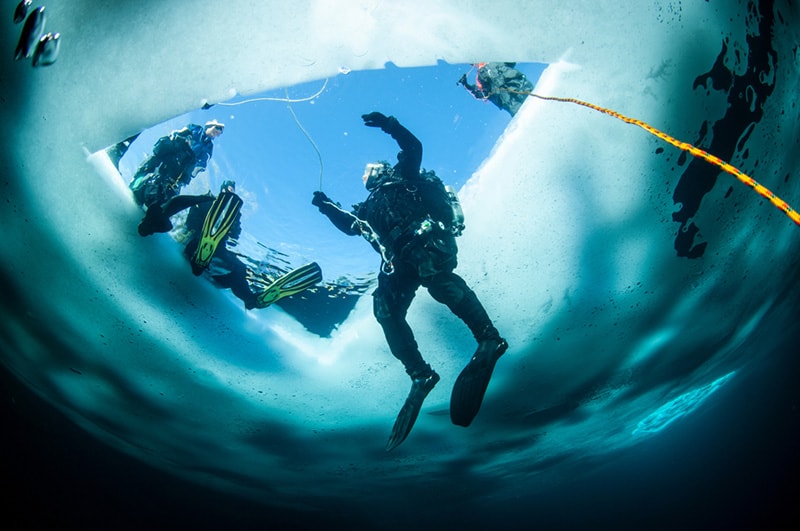It is highly recommended that you have good physical fitness so that your safety during a dive is always guaranteed. Being overweight is also considered a fundamental cause of decompression sickness among the diver community.
And if you are bored of gym classes, scuba diving can become a fantastic choice. It not only works well for all ages but also offers them incredible diving experiences. This aquatic sport lets you marvel at underwater beauty while burning your calories through movements.
For that reason, scuba diving is not a leisure activity in summer but an effective workout for anyone who wants to lose weight. This article will provide you with detailed information about the number of calories you can burn after a dive.
Besides, I also explained in detail how the calories would be consumed during scuba diving so that you can make your own diet plan.
Table of Contents
How Many Calories Can You Burn While Scuba Diving?

On average, scuba diving will burn about 300 to 700 calories per hour, which is equivalent to an hour of jogging. However, the number of calories consumed in reality can change significantly depending on other factors such as water temperature, gender, and physical fitness.
Scuba diving is a great activity to enjoy while still allowing you to burn calories and keep your body shape. For that reason, it is not uncommon to explain why people dive more instead of spending hours on treadmills or doing cardio workouts and strength training ineffectively.
In addition to an average of 400-700 calories burned according to PADI estimates, divers can calculate their own energy expenditure based on the formula below:
Total energy expenditure in calories = MET value x Body Weight in kilograms
One MET lets you know how much your actual energy is used for resting or sitting still in one hour. Medical experts have agreed with each other that scuba diving has a value of 7 METs. (1 MET equals to 1 Kcal/ kg/ hour)
For instance, a person who weighs 70 kg will burn 490 calories if he or she dives for one hour. The calculation can be done as follows:
7 METs X 70 kg Body Weight = 490 calories per hour
The above formula is the most accessible way for every diver to calculate calories burned during a dive. Although the calculation can be slightly miscalculated because it ignores such an important environmental factor as water temperature, its high accuracy is still acceptable.
How Does Scuba Diving Burn Calories?

There are a lot of factors determining how many calories will be burned during a dive. However, the most popular reason is that the water drag combined with the high pressure requires divers to burn their calories for moving effortlessly.
In addition, other factors, including heat loss, physical fitness, and environmental conditions, contribute to burning calories as well.
I have listed some of the most outstanding factors affecting the number of calorie consumption. Let’s get started.
1. Pre- And Post-dive
Before any dive, you will have to make a few necessary preparations. For example, you may walk hours to far-off diving destinations, carry your heavy gear on the back to an entry point, or just simply check whether the equipment operates properly or not.
All of these activities will burn calories. The more bulky your dive equipment is, the more calories will be consumed. You will burn lots of energy at the end of your dive as well. That’s because you need to come back to the boat’s deck by climbing a ladder.
Most scuba divers wear BCDs or wetsuits to keep themselves warm. And thereby, the weight of these gear will require you to consume more calories for supporting effortless movements both on land and underwater.
2. Dealing With the Unexpected
Once you enter the water, you may face powerful currents that can threaten your life. No matter how carefully you plan prior to any dive, the sea is always dangerous and unforeseen.
The weather conditions can be more severe, waves will be stronger, and surges may be higher. Hence, scuba divers can encounter more difficulties finding an exit point, or their fins are likely to need more energy to create a powerful kick against strong currents.
Under such challenging circumstances, decent physical fitness is another crucial factor that profoundly affects a diver’s safety. Of course, seasoned divers with good health will have a higher survival rate than people with only experience.
Besides, if your buddy suddenly becomes tired, you may have to help them carry the gear and quickly pull them ashore. You cannot exactly know about the physical health condition of all dive buddies; thus, always remember to handle this situation.
These out-of-plan activities illustrate life-threatening risks that every diver may confront, and all of them burn countless calories.
3. Internal Thermostat
The thermal conductivity of water is 25 times greater than that of air, which means that your body heat will be lost significantly faster while scuba diving. This enhances the danger of hypothermia if you stay underwater too long, even scuba diving in warm waters like Hawaii.
Therefore, to protect itself, your body automatically activates burning calories so that its internal temperature is always maintained at 37 degrees Celsius. This process of calorie consumption is a part of the body’s thermoregulation and plays a vital role in compensating for heat loss.
In addition, you should keep in mind that a high-quality wetsuit is required regardless of diving on tropical or icy beaches. The main reason is that sufficient thermal protection can help delay getting cold and slow down calorie burning to avoid being exhausted during a dive.
Read my article on What to Wear Scuba Diving to know which type of clothes you must buy for scuba diving.
This Youtube video gives thorough instructions for anyone who plans to dive in cold waters:
4. Fuel Consumption
The number of calories burned for a dive also relies on how much effort you put into it. The more challenging the dive type you do, the more attempts it requires to make. This leads to you needing an equivalent amount of calories burned.
According to PADI statistics, shore dives consume about 600 calories per hour, while boat diving uses just 300 calories at the same rate. This means that a shore dive is similar to a one-hour jog and boat dives seem to be a brisk walk on land.
However, the water temperature decides how many calories are burned as well. Shore diving in temperate destinations will be considerably different from in tropical waters.
5. Depth
The water pressure will be higher when you dive deeper. This explains why your body needs more energy plus a pair of scuba fins to generate stronger kicks to propel yourself forward.
In addition, you will burn more calories during the ascending process since you may have to swim against the water flow.
PADI estimates indicate that deep-diving will make you consume calories much more than shallow dives. Meanwhile, a boat dive requires higher energy consumption than a shore dive if both are taken on a beach with the same climate.
Learn more about How Deep You Can Scuba Dive here!

6. Temperature
As I said before, water has a considerable influence on your body’s thermoregulation; hence, there is no doubt that water temperature affects you significantly as well. The cooler the underwater environment is, the quicker your body loses heat.
This can be explained by the fact that your body must work harder to keep you warm in icy waters, forcing it to burn many calories to prevent thermal loss. Besides, even when you dive into extremely hot destinations, a remarkable number of calories will be burned.
That’s because your body must adjust its internal temperature to adapt well to the water one. For example, the metabolic system increasingly operates to burn calories. This will help your body radiate heat, ensuring the temperature inside is not too different from outside.

7. Gender
Men often intake 2500 calories every day, which is 500 calories more than women (source nhs.uk). The lean muscle mass of a man is also higher than that of his counterpart.
For these two primary reasons above, men tend to burn at least 40% more calories than women in the same diving conditions.
8. Physical Fitness
As far as I am concerned above, physical fitness is one of the essential factors in deciding whether a diver can survive in emergencies. Entry-level divers often burn more calories compared to seasoned ones since they exert more effort to breathe comfortably underwater.
Additionally, beginners need more calories when diving against a strong current, resulting in exhaustion or, worse, death.
Meanwhile, advanced people are usually more experienced as well as they know how to control the air consumption to prevent their scuba tanks from suddenly running out of oxygen.
Out-of-air situations highly result in drowning and many other dangers of scuba diving. Let’s see my article about How Dangerous Is Scuba Diving and get some tips about avoiding it.
Besides, the number of calories burned is also decided by the bodyweight of a diver. On average, a person weighing 150 pounds will use around 475 calories per hour while diving. Furthermore, people with higher lean muscles will burn more energy than those with lower ones.
Staying too long underwater is extremely dangerous since it can lead to dehydration. Learn some tips to avoid this danger regardless of how excellent your physical fitness is.
Frequently Asked Questions
Is there any problem related to the number of calories burned while scuba diving still confuses you? The answers to the most frequently asked questions below may clear your thoughts.
Does Scuba Diving Make You Lose Weight?
Your dream to be slim and in good shape without strength training can come true just by scuba diving. This fascinating sport is a low-impact exercise activity that enables everyone to consume redundant calories. You will lose weight after a few months of diving as a result.
Scuba diving functions as a full-body workout, and it is light enough so that you will not feel fatigued after any practice. When submerged, your entire body must be active to resist high pressure and facilitate moving around in the water.
This process will burn a large number of calories, ranging from 400 to 700, as PADI estimates. If you do repetitive diving daily for 30 minutes, 1.96 pounds of fat in the body can be lost every month. Frequently note the calories burned in your dive computer’s logbook for an easy diet.
Some other alternatives in a weightless environment can be helpful for weight loss; check it out here Scuba Diving Exercises!
Why Am I So Hungry After Scuba Diving?
Scuba diving makes scuba divers burn calories, which is the primary reason why they often feel hungry after a long dive. Their bodies at this time need an amount of energy to compensate for calorie loss. This gives divers an appetite for something.
Another cause is dehydration which occurs when moisture inside your body saturates the air in your lungs. This situation makes you feel hungry but thirsty, in fact.
Conclusion
Scuba diving provides you with the chance to explore what underwater life is. Besides, it is regarded as a form of exercise that allows for keeping fit and maintaining weight. Depending on different factors, the number of calories burned is distinct.
However, a diver will consume 400-700 calories at an average level. If you dive into icy destinations or go deeper, the actual number may be more considerable. Although scuba diving is funny and fabulous, you should not stay underwater too long to avoid hypothermia and dehydration.
Do you have any suggestions and remarks to make? Kindly send them to me through the comment section below. Do not forget to share this article with your friends and relatives as an effective way to motivate me to write more in the future.
